
Data management recommendations
It is important that you are aware of duties and responsibilities regarding data generated in the course of your research at GFZ. The fundamental context is good scientific practice based on the principles of scientific honesty, conscientiousness, integrity and open discourse, as set forth by the German Research Foundation (DFG) and adopted by GFZ. In the Guidelines for Research Data Management, GFZ “acknowledges the principles of open access to knowledge, results and technology”. Here is some practical advice and background on this topic.
Data can be a gift that keeps on giving if it can be reused and reproduced even by someone not familiar with your work. Upon completing your project, you must hand over your project data. Project data includes data you generated or included in your analyses which may be used further by your group (e.g. measured data, derived and compiled data), as well as the data used in publications. While you are responsible for conscientious data management during your project, the responsibility that your data are archived, are findable, and understandable, bears your section leader - even when you are no longer available to answer questions. Many sections have data management guidelines and practices. Inquire with your advisor or section lead for advice and information. For further questions, contact the staff at GFZ Data Services who may be able to resolve them with you. Finally, think about data safety. Maintaining backups of your data is an essential concern for your project. Contact your supervisor or the IT administrator of your section to learn about the backup possibilities offered by the IT Services and Operation of the GFZ.
Data publications are individual publications of datasets (with assigned persistent identifier; DOI) through research data repositories. Data publications are regarded as best practice for data sharing and are required by most publishers and funding agencies. Research data repositories are internet archives for data and provide a means of fully citable publication of data. Domain repositories, i.e. research data repositories that are specialised to one scientific domain, are the preferred choice (e.g. Hanson et al., 2015). GFZ Data Services is a domain repository for the Geosciences domain operated by the GFZ Library and Information Services. GFZ Data Services can assist you with any questions you may have in this regard.
Metadata, descriptions of your data so that it can be understood and reused, must always accompany your data. Managing your data requires a sound data management strategy, ideally as you begin your project as it will help you to stay organized, save your time (no repetitive data descriptions in emails, in person, on the phone), and will prepare you to hand over your data in the stressful final period of your project.
Finally, consider the following example of a project for your project folder structure, possibly adapting it to existing data management practices in your section or laboratory:
